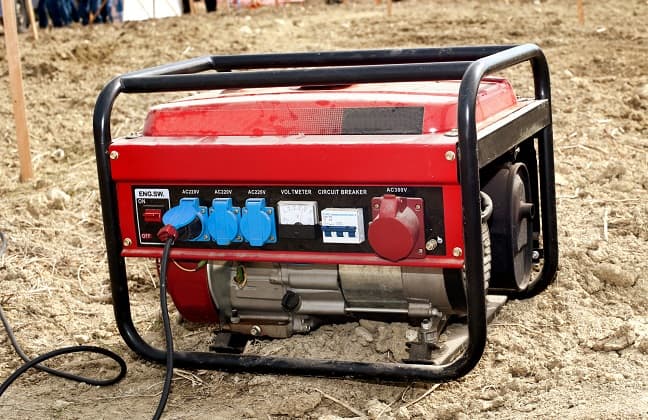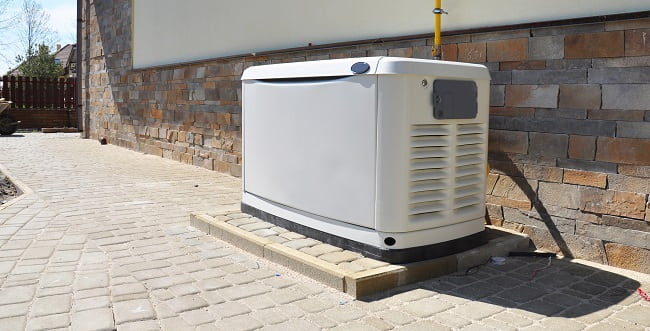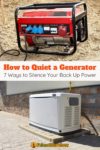Generators are a prepping essential for both short-term power outages and post-disaster situations, but there’s no getting around the fact that they are noisy.
In a best-case scenario, generator noise is a nuisance for you and your neighbors. In a worst-case scenario – if there are looters on the prowl and you’re trying to lie low – it could be downright dangerous.
The good news is that there are steps you can take to reduce generator noise, whether you have a diesel, gas or propane generator.
In this article, we look at seven free and low-cost solutions to quiet a generator.
Why Are Generators So Noisy?
Most generators produce around 60-80 decibels of noise. This is a combination of sound produced by the engine, cooling fan, alternator and engine. Fluctuations in the alternator windings and mechanical vibration of structural components can also cause mechanical noise.
States have different noise limits based on location and zoning. Large, noisy generators could easily breach these limits, particularly in built-up areas, so it’s worth checking your local guidance before buying a generator.
To minimize the noise produced by your generator, you may need to use a combination of solutions.
1) Buy the Right Generator for Your Needs
You may think that bigger is automatically better, but when it comes to generators, bigger is almost always noisier.
For example, the Champion 7500 Watt Dual Fuel Generator operates at 74dBa compared to the 68dBa output produced by the 3800-watt version.
If having a quiet generator is a priority, then look at how you can minimize your power needs and buy a generator with an output slightly greater than your total demand. (Running a generator constantly on full load reduces its efficiency.)
Use our handy calculator to work out what size generator you need.
The type of fuel you use also affects the volume of noise produced. Diesel generators tend to be the noisiest, followed by gas generators, dual fuel options, and then propane generators.
Inverter generators, such as the Champion 3500W Portable Inverter Generator are designed to be quiet; however, they’re limited in size and more expensive than conventional generators.
2) Stand Your Generator on a Soft, Flat Surface

One easy, no-cost way to reduce generator noise is to look at where it’s located. You want the surface under the generator to dampen rather than exacerbate vibrations.
Placing your generator on dirt or grass is a better option than concrete or wood, as these hard surfaces reflect sound. Metal is one of the worst materials at absorbing noise, as you’ll find out if you stand under a tin roof in the rain!
However, large portable generators are heavy and if the ground is really soft or muddy, they may sink in and become impossible to move. If you need to site your generator on harder ground, then use rubber feet or place an anti-vibration mat underneath it to dampen vibrations.
Finally, make sure your generator is on flat ground. Any unevenness, especially on concrete, may cause the generator to move or vibrate. This will cause excess noise and could damage components.
3) Move the Exhaust Pipe
Hot air naturally rises. Most generators have a horizontal exhaust pipe that blows air out rather than up. If you have the option to switch your exhaust pipe to a vertical position, or if you fit a vertical exhaust, it will help reduce the noise your generator produces.
4) Mufflers and Silencers

The next step to addressing exhaust noise might be to replace the muffler, particularly if the generator is old and hasn’t been serviced recently.
Simply replacing the muffler may cut the noise output, but you could go one step further and install a quiet muffler (Amazon link) on the exhaust.
To get a good seal, the new muffler may need welding in place. If you don’t have the skills to do a good job, it’s worth getting a small engine mechanic to do the work for you.
You can also buy silencers that fit onto the generator’s exhaust, though these can be expensive and may not be as effective at reducing generator noise as other methods.
5) Use Water to Muffle Exhaust Noise
Water is an excellent sound absorber, so if you’re after a temporary fix to reduce exhaust noise, this hack might be worth trying.
Connect one end of a section of hosepipe to your generator’s exhaust and place the other end in a bucket of water. The water dampens the noise while still letting exhaust gases escape.
To prevent water from traveling back up the pipe into the generator, make sure the generator exhaust is higher than the bucket of water. You can also poke a small hole in the hosepipe so that any backflow leaks out.
Note: Be very careful using water around generators; mistakes can be fatal. See can I run a generator in the rain.
6) Use Sound Deflectors
Sound deflectors are essentially a temporary version of a baffle box. Simply prop up sheets of plywood against your generator to absorb sound waves and direct them down into the ground. This works best when your generator is on a soft surface, such as a grassed area, that will naturally absorb noise.
Make sure you use a fire-resistant material, such as drywall, for the side of the generator that houses the exhaust. You will also need to leave plenty of room for air circulation, as with the setup in the video below.
This is a simple and somewhat portable solution, but it’s not ideal in every situation. If it’s windy, the panels are likely to blow over. Plus, you don’t want a giant piece of plywood hurtling toward your windows! It’s a good emergency option to help reduce generator noise, but if you’re planning on keeping your generator at home, an acoustic enclosure will be a safer long-term option.
7) Build an Acoustic Enclosure

Sometimes called a baffle box, an acoustic enclosure acts as a barrier to sound waves, muffling the noise produced by your generator. You can buy ready-made acoustic boxes, but they’re pretty easy and cheap to build yourself.
Make sure you cut sufficient holes in the box for ventilation and cooling and leave an opening to allow exhaust gases to escape. You may also want to include a rubber flap or hatch for in-situ checks and refueling.
You can line the inside of the box with a sound-absorbing material such as mass-loaded vinyl to make it more soundproof and add a fan to help keep the generator cool. Always check the temperature inside the enclosure, as the build-up of heat can make the generator less efficient.
Here’s a tutorial to make a basic soundproof generator box:


